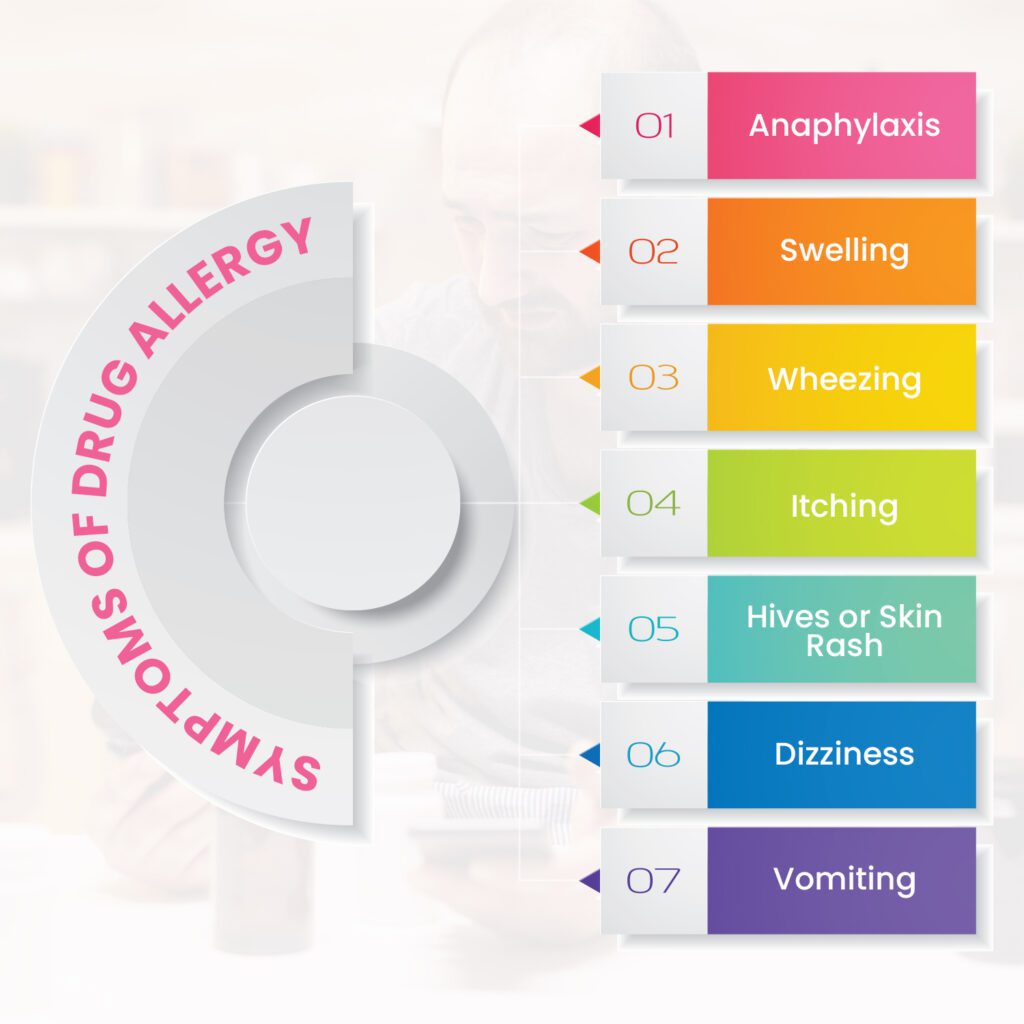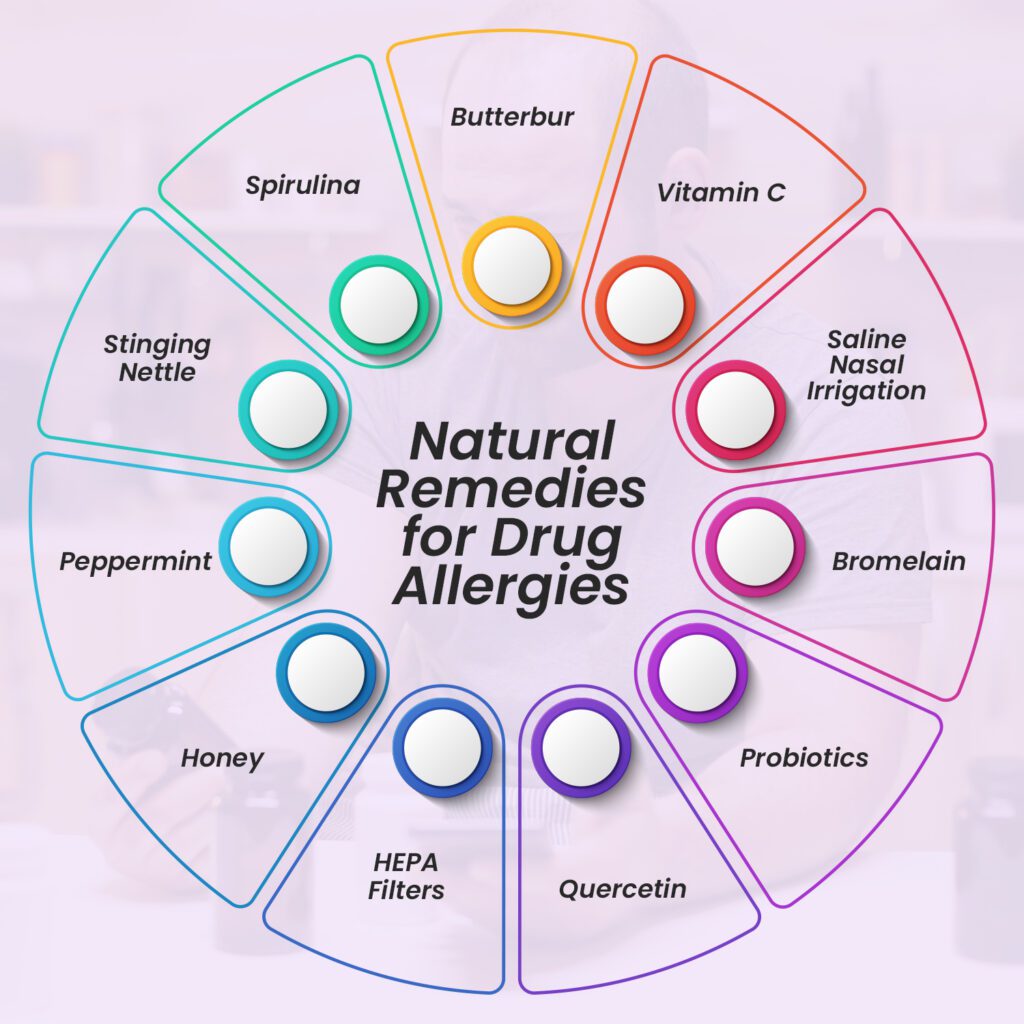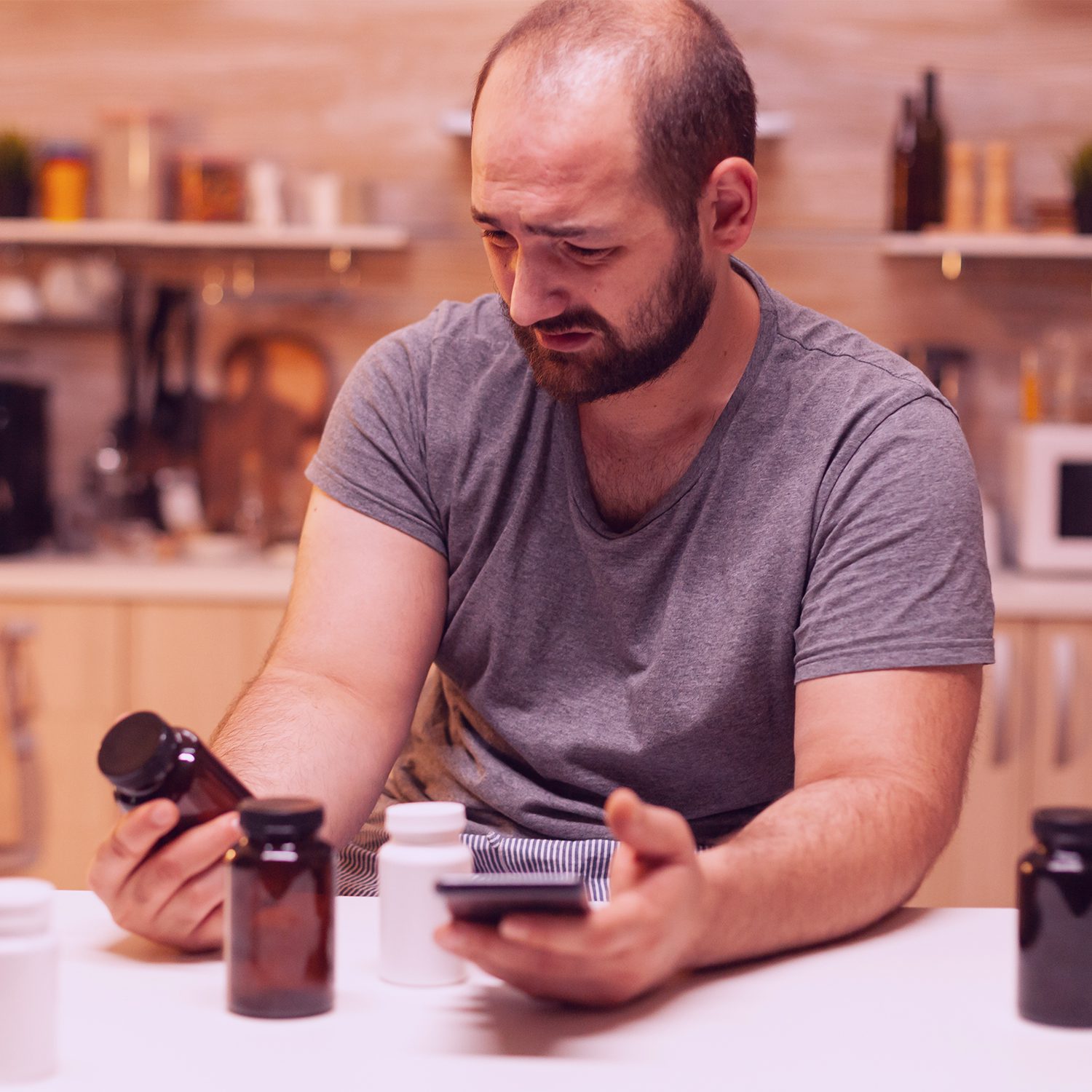


If you have difficulty breathing after taking some medications or develop hives and rash, you may have a drug allergy. Just like it can be with other allergic reactions, symptoms of drug allergy can develop when your body’s immune system is sensitive to some substances in the medication you are taking. The immune system sees them as foreign invaders and then releases some chemicals to fight against them. You can manage your allergy by using natural remedies for drug allergies.
Table of Contents
You will learn the following from this article:
What is Drug Allergy?
People who suffer from drug allergies may experience symptoms from injection, powder, pill, or liquid medication. If you are unsure about the symptoms you are experiencing or the safety of the medication, you may have to consult an allergist before using any of the natural remedies for drug allergies.
Symptoms of Drug Allergy

Even though you may not experience any allergic reaction the first time you take a drug, it may mean that your body is producing antibodies to the drug. Because of this, the next time you take that drug, your immune system may consider it as an invader, and you’ll develop symptoms because your body releases chemicals to defend against the drug.
The following are common symptoms people with drug allergy experience:
- Anaphylaxis, a life-threatening body reaction that can affect two or more body organs at the same time (for instance, when there are both difficulties in breathing and rash)
- Swelling
- Wheezing or other problems associated with breathing
- Itching
- Hives or skin rash
- Feeling light-headed or dizzy
- Vomiting
Reactions from drug allergies can occur in any part of your body.
Penicillin is the cause of most allergic reactions to drugs. Just because you show some allergy symptoms when you take penicillin does not mean that you will react to medications related to it, such as amoxicillin, but you will likely do. In the same vein, because you reacted to penicillin or any other drug at a point does not mean that you will suffer the same reaction in the future.
Other drugs that occasionally cause allergic reactions include Pediazole (erythromycin-sulfisoxazole) and Bactrim (sulfamethoxazole-trimethoprim). However, nonantibiotic drugs that contain sulfa possess a very low risk.
How to Diagnose Drug Allergy
Unlike the other forms of allergy, drug allergies can be challenging to diagnose. The only drug allergy you can diagnose via a skin test is penicillin-type drugs. However, some allergic reactions to some other drugs – for instance, asthma and hives, can look like certain diseases.
When you consult your allergist, the professional would like to know the answer to all these:
- What is the drug you suspect caused your reaction?
- When did you begin to take it? Have you stopped taking it?
- How long after taking the drug did you notice the reaction, and what did you experience?
- For how long did you suffer the reactions, and what did you do to relieve them?
- Apart from the drug that gives you the allergic reaction, what other medications do you take (both over-the-counter and prescription)?
- Do you take a mineral supplement or vitamins, or do you consume herbal medications? If your answer is yes, which ones do you take?
Your allergist may also want to find out if you react to any other medication. If it is possible, you should bring the suspected medicines with you. This will assist the allergist in recommending alternatives as required. The natural remedies for drug allergies may be what you need.
Management and Treatment of Drug Allergy
If you notice that your body is allergic to some drugs:
- Ensure that your doctors are aware of this allergy, including the symptoms you possibly experience.
- Find out about the kinds of drugs you should avoid using.
- Ask about an alternative drug to the one that is triggering your allergy.
- Wear an emergency necklace or bracelet that identifies your allergy.
Anaphylaxis
Anaphylaxis is a life-threatening reaction that can affect two or more organs at the same time. If you are suffering from anaphylaxis, you should seek emergency medical care immediately.
Moreover, if you’re caring for a person who seems to be having a severe reaction to a particular drug, inform the emergency care team of the same medication that was taken, what dosage was taken, and when it was taken.
If the allergy isn’t life-threatening, your allergist may give you:
- an antihistamine to fight the allergic reaction
- an anti-inflammatory drug that is nonsteroidal, such as aspirin, a corticosteroid, or ibuprofen to help reduce inflammation
Drug Desensitization
If your allergist does not have a suitable alternative to the drug you are allergic to, you may have to undergo drug desensitization. This involves taking the medication in high amounts until your body can tolerate the needed dose without serious side effects. This process should best be carried out in a hospital to have immediate medical attention if there is any problem.
Desensitization can only work if you are taking the drug every day. Once you stop the drug intake (for instance, when the cycle of chemotherapy ends), you might need to be desensitized a second time if you would be retaking the drug.
Penicillin Allergy
Many people claim to have allergies to penicillin; about 10 percent of people have claimed to be allergic to this popular antibiotic, making it the most commonly reported drug allergy. However, studies have shown that over 90 percent of people who think they are allergic to penicillin are not.
Penicillin that Alexander Fleming famously discovered in 1928 is used today in treating various conditions like strep throat. Even though it works effectively, some people avoid using it for fear of developing an allergic reaction. Unfortunately, the only way to tell if you are allergic to penicillin is to get tested by an allergist.
Symptoms of Penicillin Allergy
The common allergic reactions to penicillin are mild to moderate; severe reactions to penicillin are not common. The mild and moderate symptoms may include any of the following:
- trouble breathing
- hives
- coughing
- tissue swelling beneath the skin often occurs around the face (this is also known as angioedema)
- wheezing
- tightness of the throat
Anaphylaxis is a more severe reaction to penicillin, and it occurs only in susceptible patients. Anaphylaxis attacks suddenly without prior warning; the attack can worsen and may lead to death. The symptoms of anaphylaxis might not only be visible on the skin. Any of the following symptoms might be an indication of anaphylaxis:
- fainting, dizziness, loss of consciousness, which can result in heart failure or shock
- swelling of the lips, nose, throat, and tongue
- difficulty breathing and tightness in the chest
These symptoms are often pretty severe and require immediate medical attention.
11 Natural Remedies for Drug Allergies

If you must take something to relieve your allergy symptoms, proper medications will most likely help reduce the symptoms. Several drugs can help ease drug allergy symptoms, such as glucocorticoids, decongestants, and antihistamines. These three have proved to be quite effective during clinical trials.
Besides drugs, however, there are some other alternative solutions, such as natural remedies for drug allergies. I have listed the best treatments that work below:
1. Butterbur
The compounds that butterbur contains might be effective in decreasing the immune response in allergies. However, be very careful whenever you are using butterbur as some of the products have some chemicals that may affect your lungs or liver, resulting in cancer. These harmful; chemicals are called pyrrolizidine alkaloids or Pas).
Also, butterbur may induce allergic reactions in people that already have allergies to such plants as daisies, marigolds, chrysanthemum, and ragweed.
2. Vitamin C
Vitamin C is a powerful antioxidant, and so it can slow down the production of histamine. As a result, vitamin C might be effective for people suffering from drug allergies. However, for effective results, you should administer vitamin C in high dosage through intravenous infusion.
3. Saline Nasal Irrigation
To flush out allergens and mucus, you should rinse your nose with OTC saline (you should do this with the aid of neti pot). Some studies have revealed that this process can provide relief for drug allergies. But like the butterbur, you have to be very careful while using saline nasal irrigation. The FDA admonishes that making use of tap water for saline nasal irrigation may result in death. Tap water has a low level of organisms like amoebas and bacteria. These organisms can stay alive in your nasal passages and may cause some severe and possibly fatal infections. Only make use of previously boiled, sterile, or distilled water for your saline nasal irrigation.
4. Bromelain
Bromelain is an enzyme extracted from pineapple. It contains anti-inflammatory properties. Bromelain is not suitable for children and pregnant women due to the risk of bleeding. Bromelain is also not ideal for people allergic to pineapples.
5. Probiotics
Probiotics have different degrees of effectiveness in improving the symptoms of drug allergy. However, probiotics are a pretty safe option to try because they have little or no side effects. You can get probiotics in different forms, such as capsules, powders, yogurt, milk, etc.
6. Quercetin
Quercetin naturally occurs in red wine, grapes, tomatoes, tea (especially green tea), berries, apples, capers, and onions. The anti-inflammatory and antioxidant properties of quercetin make it effective in battling drug allergy symptoms or any other allergy.
7. HEPA Filters
Using vacuums and air purifiers with HEPA filters can help relieve your drug allergy symptoms, especially if you are sensitive to the indoor allergen. However, sometimes your drug allergy symptoms may trigger some other allergies. So HEPA filter gets rid of 99.7% bacteria, mold, pollen, and dust, among some other tiny particles invisible to the eye. HEPA stands for High-Efficient Particulate Air.
The HEPA air purifier will get rid of irritants from the air, and a vacuum with a HEPA filter will trap allergens and dust, keeping them from being expelled in the exhaust. Therefore, many experts have concluded that HEPA filters are very effective for people who suffer from allergies.
8. Honey
Honey is a solution to many health problems, and honey has been around for thousands of years. People have been using honey to cure a lot of health problems due to its antioxidant and anti-inflammatory properties. However, there have been varying conflicting reports about how effective honey is in relieving allergy symptoms. Some studies claim that taking local honey improves drug allergy symptoms; others have argued that it does not. In whichever way you are using it, do not give honey to a child below a year old due to the potential risk of botulism from toxins developed by bacteria.
9. Peppermint Oil
Peppermint oil has the reputation of being one of the most effective natural remedies for drug allergies because of its natural decongestant and anti-inflammatory effects. However, while peppermint oil may help relieve the symptoms of drug allergy, you should also know that it can serve as an allergen to some people. Anyone allergic to peppermint oil may develop contact dermatitis (known as skin rash) or some other allergy symptoms.
10. Stinging Nettle
Laboratory test has shown that stinging nettle can act against histamine release, including other pathways of allergic reactions. However, the clinical data about the ability of stinging nettle to relieve allergy symptoms are conflicting. Still, many have claimed that stinging nettle helps them to deal with their allergies a lot better.
11. Spirulina
Spirulina is an alga, bluish and greenish in color. It has anti-inflammatory properties. Research has discovered that spirulina may help relieve allergy symptoms, such as itching, runny nose, nasal congestion, and sneezing.
Final Thoughts
If the natural remedies for drug allergies do not work for you, your allergist may recommend some allergist shots. The shots will allow your immune system to adapt to the allergens that are giving you problems. However, you should know that these shots can take months – even years – to begin working.
Do not try to use these home remedies to relieve the symptoms you may be having if you are not sure that it is an allergy. Using the wrong medications or natural treatments may cause you more harm than good.
Post Disclaimer
The information contained in this post "Drug Allergies: 11 Natural Remedies for Drug Allergies" is for educational purposes only. Always consult your primary care doctor before using the remedies that are provided. The information is provided by The Hidden Cures and while we do timely, in-depth research on the information that we provide to you, everything stated may not be up to date or accurate from the time it was written.



